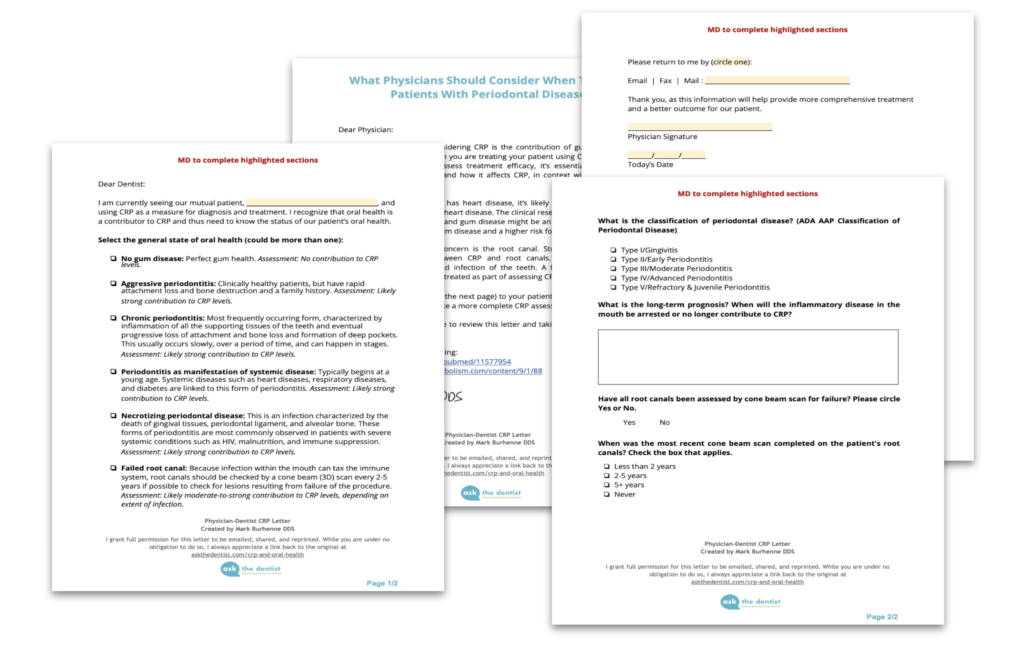Did you know your C-reactive protein (CRP) test results can be influenced by the state of your oral health?
The problem with CRP testing is we neglect to take into account the mouth’s contribution to overall inflammation. Even gingivitis in its earliest stages can increase your CRP levels.
Here’s what to know and how to get your doctor and dentist on the same page.
It is essential for your physician to have a clear picture of your oral health when treating you for inflammation.
Mark Burhenne, DDS
What is CRP (C-Reactive Protein)?
CRP stands for C-reactive protein, and it is a marker of overall inflammation in your body.
If your doctor suspects you could have an inflammatory condition, they will likely prescribe you a CRP (C-reactive protein) test.
CRP is a rough tool and certainly not the end-all for quantifying and diagnosing inflammation, although it was found to be more accurate than using cholesterol levels in predicting heart disease.
Get Dr. B’s Dental Health Tips
Free weekly dental health advice in your inbox, plus 10 Insider Secrets to Dental Care as a free download when you sign up

Why do we test CRP levels?
By measuring the amount of inflammation in your body, your physician is able to determine whether inflammation is improving or getting worse, and adjust your treatment accordingly.
Inflammation is important because it is common to nearly every modern disease, including heart disease, high cholesterol, cancer, obesity, dementia, arthritis, autoimmune disease, allergies, and digestive disorders.
Inflammation is your body’s response to injury, infection, or stress. Inflammation is the body’s attempt to protect itself from something harmful and start to heal itself. But when inflammation becomes chronic, this is when issues crop up.
If your body has high levels of inflammation (high CRP), this means that your immune system is very active and you may be suffering from an illness.
How is CRP tested?
CRP is measured via a simple blood test, and it’s a way to measure inflammation in the body. It is, perhaps, the best way that we have—medically speaking—to quantify a patient’s inflammation levels in the body.
What does it mean if I have “high CRP”?
In general, we’re looking for CRP levels of less than 10 mg/L. The lower your CRP, the better. Make sure to get your doctor to explain your CRP results to you, as these are very general guidelines, and a “good” or “bad” CRP test result will vary depending on who you are as an individual, your health history, and what you’re being treated for.
Why we need to take a root-cause approach to treating CRP
What the CRP test cannot tell us is the source of the inflammation—that’s where a functional doctor and functional dentist comes into play.
A functional doctor is someone who’s not only treating your inflammation, but also looking for the root cause of that inflammation. In functional medicine, we say, “instead of continually mopping up the floor, how about looking into how we can turn off the water faucet?” When getting treated for inflammation, or any condition, it’s beneficial to look upstream to the root cause so we can “shut off the faucet.”
If your physician does not consider your oral health when interpreting your elevated CRP levels, you run the risk of treatment failing or taking longer than expected.
How does oral health affect CRP?
The clinical research now suggests that the correlation between CRP and gum disease might be an underlying mechanism in the association between gum disease and a higher risk for heart disease.
Another potential area of concern is the root canal. Studies show there’s no evidence for a connection between CRP and root canals. However, there is a connection between CRP and infection of the teeth. A failed root canal is an infected tooth and, I would argue, should be treated as part of assessing CRP.
Download the CRP Doctor’s Letter
I created this CRP Letter to bridge the gap between medicine and dentistry when treating our patients for inflammation.
This letter has helped thousands of patients to bridge the gap between dentistry and medicine when working on their inflammation.
All you have to do is print it out and take to your next appointment. If you’re a healthcare practitioner, feel free to distribute and use this letter widely.
Even if you already know you have gum disease, if your dentist and your doctor are not communicating, this critical information falls through the cracks.
Many studies are now suggesting that the correlation between CRP and gum disease might be an underlying mechanism in the association between gum disease and a higher risk for heart disease. The irony that’s lost on perhaps all of us—dentist and physicians alike—is that it may be gum disease that is contributing to the heart disease.
The mouth is the most overlooked source of inflammation in the body. Don’t let it be an oversight in your treatment plan.
Mark Burhenne DDS
References
Noack, B, et al. “Periodontal infections contribute to elevated systemic C-reactive protein level.” National Center for Biotechnology Information. U.S. National Library of Medicine, Sept. 2001. Web. 17 Apr. 2015.
Marchetti, et al. “Periodontal Disease: The Influence of Metabolic Syndrome.” Nutrition & Metabolism. Nutrition & Metabolism, 25 Sept. 2012. Web. 1 Apr. 2015.


 The New Leading Cause of Oral Cancer
The New Leading Cause of Oral Cancer